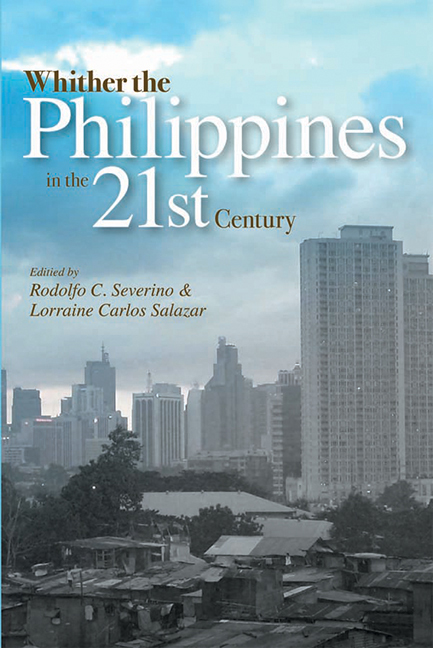Book contents
- Frontmatter
- Contents
- List of Illustrations
- Foreword
- Acknowledgements
- The Contributors
- List of Abbreviations
- Map of Southeast Asia
- 1 The Philippines in Southeast Asia
- 2 From Regime Crisis to System Change
- 3 Proposed Constitutional Reforms for Good Governance and Nation Building
- 4 The Military in Philippine Politics
- 5 Religion and Politics
- 6 The Philippine Press
- 7 Macroeconomic Issues and Challenges
- 8 Investment Climate and Business Opportunities
- 9 Why Does Poverty Persist in the Philippines?
- 10 Diaspora, Remittances, and Poverty
- 11 The Philippine Development Record
- 12 Sancho Panza in Buliok Complex
- 13 The Insurgency That Would Not Go Away
- 14 Whither the Philippines in the 21st Century?
- Index
12 - Sancho Panza in Buliok Complex
Published online by Cambridge University Press: 21 October 2015
- Frontmatter
- Contents
- List of Illustrations
- Foreword
- Acknowledgements
- The Contributors
- List of Abbreviations
- Map of Southeast Asia
- 1 The Philippines in Southeast Asia
- 2 From Regime Crisis to System Change
- 3 Proposed Constitutional Reforms for Good Governance and Nation Building
- 4 The Military in Philippine Politics
- 5 Religion and Politics
- 6 The Philippine Press
- 7 Macroeconomic Issues and Challenges
- 8 Investment Climate and Business Opportunities
- 9 Why Does Poverty Persist in the Philippines?
- 10 Diaspora, Remittances, and Poverty
- 11 The Philippine Development Record
- 12 Sancho Panza in Buliok Complex
- 13 The Insurgency That Would Not Go Away
- 14 Whither the Philippines in the 21st Century?
- Index
Summary
We are all Islam, but we are different. I cannot understand them.” (Maguindanao merchant)
They don't have a message about the future. You can't simply say Islam is the only solution. You have to deal with problems of electricity, water, the environment, transportation. Those can't be Islamic.” (Edward Said on Hamas)
If we read past the rhetoric and examine more closely the political dynamics of Muslim-Filipino separatism, the following peculiarities become apparent. First, despite repeated declarations by the Moro National Liberation Front (MNLF) and the Moro Islamic Liberation Front (MILF), their rebellions are better understood as modern mobilizations against the intrusive reach of the nation state than as the latest edition of an epic Moro struggle against various colonialisms. The fighting is also portrayed as a principled act in pursuit of a sovereign Bangsamoro (Moro nation); but this is a slant that downplays ethnic, class, gender, and linguistic cleavages within the umma (community) itself. Second, while we should not deny the intensity of the separatist war, we also must be aware of its limited geography and the brevity of its major battles. Almost 95 per cent of the MNLF's and the MILF's clashes with the Armed Forces of the Philippines (AFP) occurred within a circumscribed area, and efforts by both groups to expand their military operations have failed. Third, the radicalism of their message is often belied by their political pragmatism. The MNLF was forced by Libya, the Organization of Islamic Conference (OIC), and Malaysia to negotiate with the Philippine government, with disastrous results. The MILF has called for an Islamic revolution but has asked the United States and Malaysia, and most recently Japan, to broker the peace talks with the government.
This chapter examines these issues to explain why, despite having taken a toll on the weak, corrupt and inefficient Philippine state, Muslim separatists are still unsuccessful in reaching their goal. The Bangsamoro Republik is nowhere in sight, the MNLF has been integrated into the state it once fought, and the MILF is having second thoughts about the viability of armed struggle.
- Type
- Chapter
- Information
- Whither the Philippines in the 21st Century? , pp. 277 - 312Publisher: ISEAS–Yusof Ishak InstitutePrint publication year: 2007

